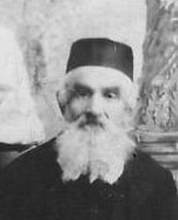 I was interested to read this week of the death of the Viznitzer Rebbe Mordechai Hager in New York at the grand age of 95, for I have a distant (although unconfirmed) connection to the Viznitzer rabbis. My great-great-great grandfather, Akiva Hager (pictured), was in some way related to the Hager rabbis of Viznitz, but even back in the 19th century, apparently no-one in the family could actually put their finger on the blood link that connected them to the esteemed rabbis. Nevertheless, the family was always aware of how distinguished the Hager name was and sharing the name meant that they commanded respect among the Jewish community in which they lived. The Viznitzer rabbis were one of the most famous and revered dynasties in Hassidic Judaism. The sect was founded in the mid-1800s by Rabbi Menachem Mendl Hager in Viznitz (Vyzhnytsia in Ukrainian), a village in the foothills of the Carpathian mountains now in southwest Ukraine. Mordechai Hager was born in 1922, in Oradea, Romania, known in Yiddish as Grosswardein. His father, Chaim Meir Hager, was the fourth grand rabbi of Viznitz, and moved the dynasty to Grosswardein during the First World War. The Viznitz rabbinical dynasty today has congregations in Israel, London and Montreal as well as New York City and state. Despite sharing the revered family name of Hager, my forefathers made the decision to drop the name in order to save my great-great-great grandfather Akiva from conscription. At that time, in the mid-19th century, Jews were a particular target of Tsar Nicholas I’s military recruiting officers, known in Yiddish as ‘happers’. The happers were supposed to take boys aged between 12 and 18, but often recruited (some would say kidnapped) younger children, some as young as eight or nine, to fulfil their quotas, bundling them into uniforms meant for youths twice their age. Military service lasted a full 25 years, but most did not survive that long. It took only days for the Jewishness of the new recruits to be squeezed out of them like water from a sponge. They were barred from following the kosher laws or keeping the Sabbath, or even from speaking Yiddish. Any boy who insisted on holding fast to the dietary laws – refusing to eat pork or soup made with lard – was beaten with a rod or deprived of drinking water. And however firm their Jewish resolve, the boys were unable to avoid marching or performing drills on the Sabbath. At the end of a ten hour march, having eaten nothing but dry bread, the young recruits would arrive exhausted at their destination and were often forced to kneel until they agreed to convert to the Orthodox Christian faith. If they continued to refuse, they had to kneel all night. Some boys would take their own lives rather than agree to convert. Others would be beaten and starved and died from fever or exposure before ever setting eyes on a battlefield. As well as changing Akiva’s name to avoid such a fate, his family refused to let him attend school or any other formal institution – it was well known that Jewish boys who tried to enrol in a Russian ‘shkole’ could find themselves offered up as recruits for the army. So Akiva avoided conscription but never learned to read or write. By the time Akiva was in his late teens, Tsar Nicholas upped the conscription rate still further as Russia headed towards the Crimean War. Wealthier families tried to bribe the conscription officers to stop them from taking their sons, but there was no guarantee of success. Akiva’s family didn’t have the money to pay a bribe and instead they sent him to the dentist to have all his teeth extracted, a procedure that must have been horribly painful in the days before anaesthetic, and altered his appearance for life. But the loss of his teeth was successful in keeping Akiva out of the army, and had that not been the case, I probably wouldn’t be here today to tell his story.
0 Comments
Leave a Reply. |
Keeping stories aliveThis blog aims to discuss historical events relating to the Jewish communities of Ukraine, and of Eastern Europe more widely. As a storyteller, I hope to keep alive stories of the past and remember those who told or experienced them. Like so many others, I am deeply troubled by the war in Ukraine and for the foreseeable future, most articles published here will focus on the war, with an emphasis on parallels with other tumultuous periods in Ukraine's tragic history. Archives
March 2024
Categories
All
|
 RSS Feed
RSS Feed
